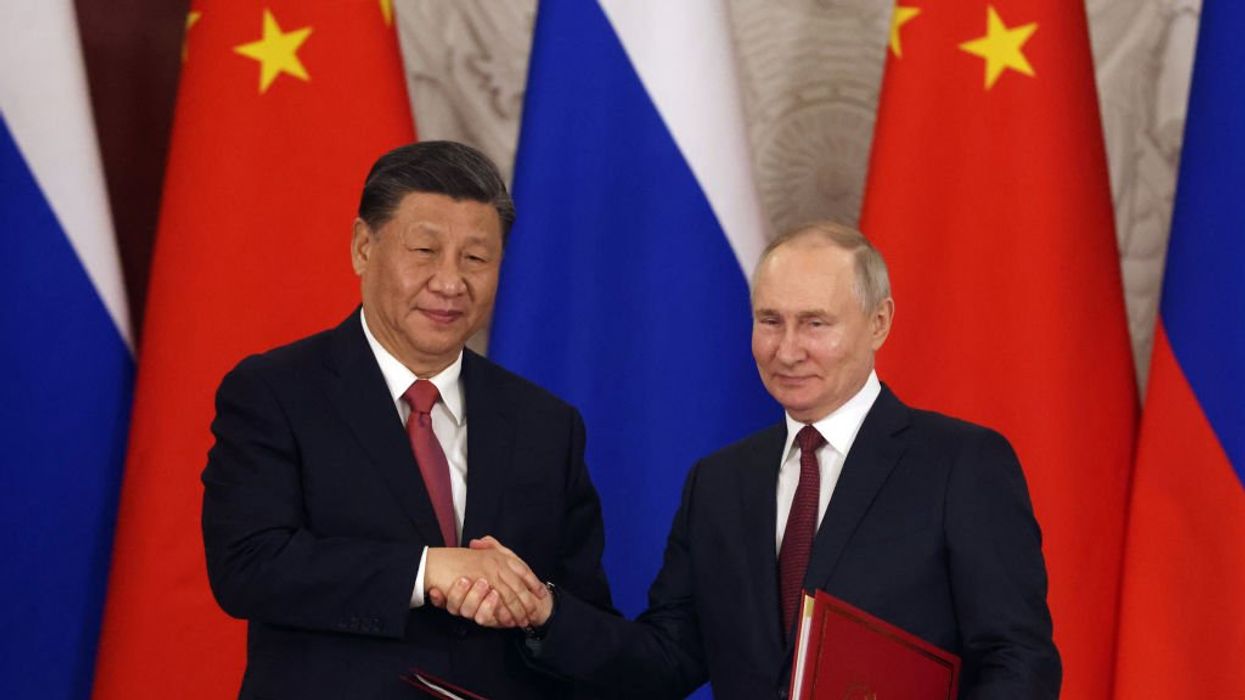
Photo by Contributor/Getty Images

Russia and Communist China further evidenced their affinities and shared geopolitical aims this week. Chinese dictator Xi Jinping and Russian President Vladimir Putin met at the Kremlin Tuesday to discuss a "new era" of bilateral ties and greater cooperation on a number of issues spanning the globe.
Following the meeting, Xi told Putin, "Change is coming that hasn't happened in 100 years. And we are driving this change together."
The South China Morning Post reported that the two nations have pledged to collaborate on issues from Southeast Asia to the Middle East and Latin America, likely contesting American supremacy in the process.
While shoring up strength in Asia, in part through the Association of Southeast Asian Nations, Russia and China will also work together on promoting Beijing's Belt and Road Initiative, which permits China to extend its power and influence throughout the developing world.
Through its BRI, China helps poorer nations build ports, rail lines, and telecommunications networks, as well as secure financing. Since this assistance is usually unaffordable by design, the BRI transforms countries into politically malleable debtors.
Russia lauded China's "objective and unbiased position" as it pertains to the war on Ukraine, noting that Moscow and Beijing "are opposed to any states and their blocs damaging the legitimate security interests of other states in order to obtain military, political and other advantages," reported Reuters.
This remark is likely a knock not just against NATO in Eastern Europe but against U.S.-led efforts to protect Taiwan from Chinese invasion.
The joint statement also intimated that China is taking on a greater role as an international peacemaker, while it simultaneously hounds dissenters across the world, interferes in foreign elections, engages in brazen espionage campaigns, and grows its military.
Russia indicated it welcomed "China's readiness to play a positive role in a political-diplomatic settlement of the Ukrainian crisis."
Chinese Foreign Ministry apparatchik Wang Wenbin claimed this week that China has "no selfish motives on the Ukraine issue, has not stood idly by ... or taken the opportunity to profit itself," reported the Associated Press.
The New York Times reported Tuesday that China has sold Russia over $12 million in drones and drone parts since the invasion of Ukraine, ensuring a "steady supply" of equipment to the front lines.
"What China has done boils down to one word, that is, to promote peace talks," added Wang, who also accused the U.S. of "fanning the flames" of conflict.
The U.S. still has nearly 1,000 troops in Syria, most of them sharing bases with Syrian Democratic Forces in the north, reported Stars and Stripes.
Prior to China's latest commitment to challenging America by proxy in the region, Russia was already doing so, engaging in what Gen. Michael Kurilla, CENTCOM'S commander, has called "unsafe and unprofessional behavior."
Russia has been harassing U.S. troops in Syria by buzzing their locations with armed ground attack aircraft, reported Task and Purpose.
In another hypocritical knock against the U.S., Xi and Putin denounced "interference in the internal affairs of other countries in the region."
While contesting American influence in the Middle East, the joint statement also indicated Russia and China were keen on greater involvement in the the Caribbean and Latin America.
In November, Xi told his Cuban counterpart that China intended to "strengthen coordination and cooperation in international and regional affairs" with the Caribbean nation.
The two will “go hand in hand down the road of building socialism with each's own characteristics," said Xi.
David Lewis, professor of international relations at the University of Exeter, noted in 2019 that historically, "attempts to reorient Russian policy toward Asia have often sought to compensate for worsening relations with the West."
Lewis suggested that Putin's "pivot to the East" risked Russia becoming China's junior, dependent partner.
Bobo Lo, a former Australian diplomat, noted in October 2021 that following its annexation of Crimea in 2014, Russia was prompted to turn to China to "fill the technological gap left by the withdrawal of Western companies in Russia. ... And Chinese investment in technology has been absolutely critical to the realization of Russia's Arctic LNG projects."
Tensions between Russia and the West have since only worsened, pushing Moscow into Beijing's lap, even at the risk of Russia becoming a junior partner, or what Harry Kazianis characterized in the New York Post as "the biggest vassal state in modern history."
According to the 2022 U.S. National Security Strategy, China and Russia "are increasingly aligned with each other but the challenges they pose are, in important ways, distinct. We will prioritize maintaining an enduring competitive edge over [China] while constraining a still profoundly dangerous Russia."
TheBlaze previously reported that the Chinese foreign minister threatened "conflict and confrontation" earlier this month if the U.S. doesn't change course as it pertains to its Chinese "containment and suppression" strategy.
Qin Gang, the genocidal communist regime's new foreign minister, criticized American efforts to outcompete China, claiming that "in reality, the U.S. side's so-called competition is all-out containment and suppression, a zero-sum game where you die and I live."
While Qin contended that the U.S. has approached competition with China with a "zero-sum" mentality, a 2021 Pentagon report indicated this may be projection.
The report noted that the CCP's aim is to "achieve 'the great rejuvenation of the Chinese nation' by 2049 to match or surpass U.S. global influence and power, displace U.S. alliances and security partnerships in the Indo-Pacific region, and revise the international order to be more advantageous to Beijing's authoritarian system."
Xi stated in October at the opening ceremony of the Chinese Communist Party's 20th National Congress, "Get the house in good repair before rain comes, and prepare to undergo the major tests of high winds and waves, and even perilous, stormy seas."
Like Blaze News? Bypass the censors, sign up for our newsletters, and get stories like this direct to your inbox. Sign up here!